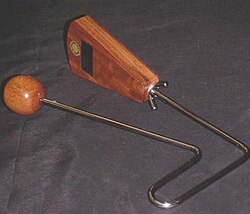Top Qs
Timeline
Chat
Perspective
Vibraslap
Percussion instrument From Wikipedia, the free encyclopedia
Remove ads
The vibraslap is a percussion instrument consisting of a piece of stiff wire (bent into a U-shape) connecting a wooden ball to a hollow box of wood. The percussionist holds the metal wire in one hand and strikes the ball (usually against the palm of their other hand). The box acts as a resonating body for a metal mechanism placed inside with a number of loosely fastened pins or rivets that vibrate and rattle against the box.[1] The instrument is a modern version of the jawbone.[2]

Remove ads
History
The vibraslap comes from the African jawbone instrument. This is the lower jawbone of a donkey or a zebra which has loose teeth that rattle when the instrument is struck.[3] The instrument was carried by enslaved people to South America where it became known as the jawbone (quijada in Spanish).[4] It became used in Latin American music in the ensuing centuries.
The modern vibraslap was invented by Martin Cohen in 1967.[5][better source needed] Cohen was told by percussionist Bobby Rosengarden, "If you want to make some money, make a jawbone that doesn't break." About the inventing process, Cohen remembers, "I had never seen a jawbone before, but I had heard one on a Cal Tjader album. I found out that it was an animal skull that you would strike, and the sound would come from the teeth-rattling in the loose sockets. So I took that concept and invented the Vibraslap, which was my first patent."[6] The vibraslap was the first patent granted to the instrument manufacturing company Latin Percussion.[7]
Remove ads
References
External links
Wikiwand - on
Seamless Wikipedia browsing. On steroids.
Remove ads


